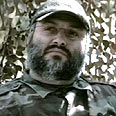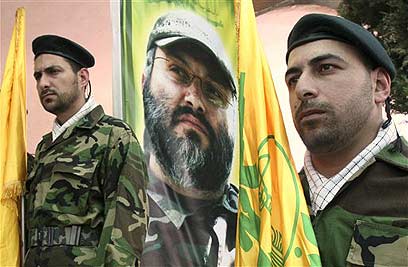
Terror threat: Number of Israeli embassies closed
Heightened alert level apparently related to anniversary of Mughniyeh assassination; in Tunisia, Islamist rally outside synagogue, chant 'Allahu Akbar' and 'Muhammad's army will return'
A number of Israeli embassies around the world have been temporarily closed due to what the Foreign Ministry called on Tuesday "irregular incidents against Israeli targets."
Israeli embassies abroad have also raised their alert level, while in Tunisia the Jewish community turned to the government for protection after Muslims rallied outside a synagogue in the capital.
The Foreign Ministry did not say which embassies were closed. It is estimate that the heightened alert level is connected to the third anniversary of top Hezbollah commander Imad Mughniyeh's assassination.
Last week the Counter Terrorism Bureau warned that the threat against Israelis abroad had increased, with a special emphasis put on Egypt, Turkey, Azerbaijan, Georgia, Armenia, the Ivory Coast, Mali, Mauritania and Venezuela.

Hezbollah honors Mughniyeh (Photo: AP)
The bureau also mentioned the elimination of former Hezbollah Secretary General Abbas Mousawi, who was killed by Israel in 1992. The bureau recommended that Israelis travelling abroad avoid places where large groups of Israelis can be found and obey local security forces' directives.
Hezbollah claims Israel was behind Mughniyeh's assassination in Damascus and has vowed to "avenge his death."
In Tunisia, radical Islamists gathered outside a synagogue in Tunis and chanted anti-Semitic slogans. Footage taken from the scene shows them chanting "Allahu Akbar" and "Khaybar, Khaybar. Oh Jews, Muhammad's army will return". They were referring to the Battle of Khaybar, which was fought in the year 629 between Muhammad and his followers against the Jews living in the oasis of Khaybar, located 150 kilometers (95 miles) from Medina in the modern-day Saudi Arabia.
Local Jews turned to the transitional government, which replaced the regime of deposed president Zine El Abidine Ben Ali last month, and expressed their concern over the apparent rise in anti-Semitic incidents in the country. "This incident can repeat itself; some groups want to take advantage of the political vacuum in the country," said Roger Bismuth, head of the local Jewish community.
Bismuth said Prime Minister Mohamed Ghannouchi asked that local Jews remain alert. In a statement on the official TAP news agency, the PM's office condemned acts of extremists at places of worship.
“These people have no other motive than to attack the values of the republican regime based on the respect of freedom and belief, tolerance and peaceful co-existence ... and the guarantee of the exercise of civic rights,” it said.
The ministry said it would “spare no effort to safeguard these values and opposes all those who want to incite violence or discord between the Tunisian people and disturb public security.”
Muslim Tunisia is home to about 1,600 Jews, most of whom live on the southern island of Djerba where its most important synagogue, reputed to be the oldest in Africa, is based and draws thousands of pilgrims every year.
It is one of the largest Jewish communities in the Arab world but significantly down from a population of 100,000 at independence from France in 1956, after which the government promulgated anti-Jewish decrees.
In April 2002 a suicide bomber rammed the wall of the Djerba synagogue with a lorry laden with natural gas in an attack claimed by Al-Qaeda that killed 14 German tourists, five Tunisians and two French visitors.
Tunisia’s interim government is struggling to stabilize the country since the fall of president Ben Ali a month ago after a groundswell of street protests, and fears new violence.
AFP contributed to the report
- Follow Ynetnews on Facebook










